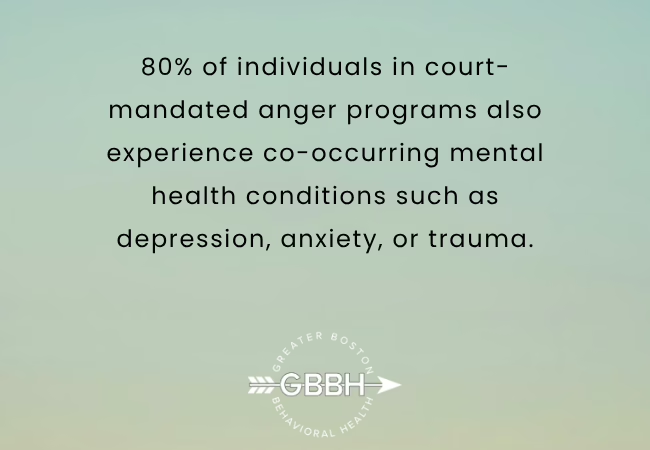Anger is a natural and necessary emotion. It can signal injustice, create boundaries, or help you stand up for yourself. But when anger becomes explosive, unpredictable, or chronic—it can damage relationships, careers, and health.
Uncontrolled anger is often a symptom of deeper emotional issues like trauma, anxiety, depression, or chronic stress. That’s where Anger Management Therapy comes in—offering a structured, therapeutic approach to identifying triggers and building healthier coping strategies.
What Is Anger Management Therapy?
Anger Management Therapy is a type of behavioral therapy designed to help individuals:
- Understand the root causes of their anger
- Identify triggers and physical warning signs
- Learn healthier emotional regulation techniques
- Reduce aggressive or destructive behaviors
- Improve communication and conflict resolution
It’s not about suppressing anger—it’s about transforming your response.
Who Needs Anger Management Therapy?
You might benefit from Anger Management Therapy if you:
- Feel out of control when angry
- Have frequent outbursts, yelling, or aggression
- Struggle with legal or workplace issues due to your temper
- Feel guilt or regret after arguments
- Experience strained relationships with family or partners
- Use substances to cope with anger
- Have been diagnosed with PTSD, bipolar disorder, or intermittent explosive disorder (IED)
If any of this sounds familiar, you’re not alone—and help is available.
Root Causes of Chronic Anger
At our mental health treatment center in Massachusetts, we explore the underlying factors that fuel unresolved anger, including:
- Childhood trauma or abuse
- Family conflict or neglect
- Past bullying or relationship trauma
- Substance use or withdrawal
- Untreated mental health disorders
- Environmental stress (job, finances, systemic pressures)
Identifying these root causes is the first step toward lasting change.
How Therapy Works: Tools You’ll Learn
Anger Management Therapy at Greater Boston Behavioral Health uses evidence-based techniques tailored to your needs. These include:
Cognitive Behavioral Therapy (CBT)
Teaches you to recognize and reframe irrational or destructive thoughts that lead to anger.
Dialectical Behavior Therapy (DBT)
Equips you with emotional regulation, distress tolerance, and mindfulness tools.
Mindfulness and Relaxation Training
Reduces the fight-or-flight response and increases moment-to-moment awareness.
Role-Playing and Communication Skills
Helps you practice constructive ways to express needs and handle conflict.
Journaling and Trigger Tracking
Increases self-awareness and pattern recognition over time.
Levels of Care That Include Anger Management Support
Inpatient and Residential Treatment Program in Massachusetts
For individuals needing 24/7 monitoring and intensive emotional stabilization.
Partial Hospitalization Program Massachusetts (PHP)
Offers full-day support while allowing you to return home at night. Includes daily anger management sessions and trauma-informed care.
Intensive Outpatient Program Massachusetts (IOP)
A flexible, part-time option ideal for those balancing treatment with work, school, or family life.
All levels of care offer individual and group therapy, peer support, and medication management as needed.
Anger and Co-Occurring Disorders
Anger issues rarely exist in a vacuum. Many people struggling with anger also experience:
- Anxiety or panic attacks
- Depression
- Substance use disorders
- Personality disorders (e.g., BPD)
- PTSD or complex trauma
That’s why our mental health programs in Massachusetts are designed to treat co-occurring disorders holistically—so that every aspect of your mental health is supported.
Family and Relationship Healing
Uncontrolled anger can devastate families. Our therapy programs also offer:
- Family therapy sessions to rebuild trust
- Couples counseling to improve communication
- Parenting support for those who struggle with patience and emotional regulation
- Boundary-setting and conflict resolution training
Healing relationships is just as important as healing yourself.
1. The Anger Cycle: What Happens When You Don’t Intervene
Anger typically follows a predictable pattern known as the anger cycle, which includes:
-
Trigger – a situation or stressor sparks frustration
-
Escalation – physical symptoms like clenched fists, racing heart, or raised voice
-
Crisis – an explosive or aggressive response
-
Recovery – exhaustion or guilt after the outburst
-
Post-crisis – shame, regret, or avoidance
Without intervention, this cycle can become habitual and self-reinforcing. Anger Management Therapy in Massachusetts helps individuals interrupt this cycle early—before it leads to lasting damage in their lives and relationships.
2. Anger in the Workplace: Professional Consequences of Untreated Rage
Uncontrolled anger doesn’t just affect personal relationships—it can also damage careers. Signs include:
-
Frequent arguments with coworkers or managers
-
Inability to take constructive feedback
-
Passive-aggressive communication or emotional shutdown
-
Absenteeism after angry episodes
-
Performance reviews affected by behavioral concerns
Employers may recommend or require therapy as part of disciplinary or return-to-work plans. Mental health programs in Massachusetts offer flexible outpatient care for professionals seeking confidential help.
3. Anger in Adolescents and Young Adults: Early Intervention Matters
Teens and young adults may not yet have the emotional language or coping tools to manage anger effectively. Warning signs include:
-
Physical fights or violent outbursts
-
School suspensions or academic decline
-
Risk-taking behavior
-
Isolation or intense mood swings
-
Drug or alcohol use as a coping mechanism
Mental therapy programs in Massachusetts that include anger management are often a critical step in helping young people develop lifelong emotional resilience.
4. When Home Isn’t Safe: Anger, Domestic Violence, and the Need for Boundaries
In some cases, uncontrolled anger leads to verbal, emotional, or physical abuse at home. While therapy can help address these patterns, it’s crucial to:
-
Recognize signs of domestic violence
-
Create safety plans if necessary
-
Involve family or couples therapy only when appropriate
-
Encourage accountability and healing—not excuses
Our residential treatment program in Massachusetts provides a safe space for individuals to de-escalate and confront unhealthy patterns, while protecting loved ones during the healing process.
Holistic Therapies That Support Emotional Regulation
In addition to talk therapy, we incorporate holistic supports to help regulate the nervous system, such as:
- Yoga and movement therapy
- Art and music therapy
- Breathwork and guided imagery
- Nutritional support for mood regulation
These approaches help clients feel calmer, safer, and more in control—especially when verbal expression is difficult.
Real Change Starts with Self-Awareness
You don’t have to “just live with” your anger. With the right tools, support, and insight, you can:
- Respond instead of react
- Communicate without lashing out
- Build stronger, healthier relationships
- Stop letting your emotions control your life
Why Choose Greater Boston Behavioral Health?
As a leading mental health treatment center in Massachusetts, we offer:
- Evidence-based anger management therapy
- Personalized care at all levels—from inpatient to outpatient
- Trauma-informed, inclusive treatment philosophy
- Flexible programs that accommodate real life
- Licensed therapists, psychiatrists, and support staff who care
Whether you’re seeking care for yourself or a loved one, our team is here to help you take control without losing yourself.
Conclusion
Anger is not the enemy—uncontrolled anger is. When left unaddressed, it can damage relationships, jeopardize careers, and erode your sense of peace. But when faced with understanding, structure, and skill-building, anger can be transformed into strength, assertiveness, and emotional clarity.
At Greater Boston Behavioral Health, we don’t just help you manage your anger—we help you understand it. Through evidence-based approaches within our Partial Hospitalization Program, Intensive Outpatient Program, and comprehensive mental health programs in Massachusetts, we guide you toward healthier responses, deeper self-awareness, and lasting emotional stability.
Whether you’re navigating long-standing struggles or recent conflicts, you’re not alone—and it’s never too late to regain control. Call us at 888.278.0716 to explore our Anger Management Therapy programs in Massachusetts today. Because real power isn’t in how loud your anger speaks—it’s in how calmly you take control.
FAQ on Anger Management Therapy in Massachusetts
Is anger management therapy only for people with violent outbursts?
No. Anger management isn’t just for extreme cases. It benefits anyone who feels overwhelmed by their anger, struggles with communication during conflict, or experiences chronic frustration or irritability.
What therapies are used in anger management treatment?
Evidence-based methods like Cognitive Behavioral Therapy (CBT), Dialectical Behavior Therapy (DBT), mindfulness, and conflict resolution training are core parts of effective anger management programs.
Can anger management therapy be part of a PHP or IOP?
Yes. Both our Partial Hospitalization Program in Massachusetts and Intensive Outpatient Program in Massachusetts include anger management as part of comprehensive mental health care.
How long does anger management therapy take to show results?
Many clients begin to experience improvements in awareness and control within a few sessions. Long-term success depends on consistency, participation, and addressing root emotional issues.
Can anger management therapy improve my relationships?
Absolutely. It teaches you to express your feelings constructively, set healthy boundaries, and respond with clarity instead of escalation—all of which enhance relationships at home, work, and in your community.


